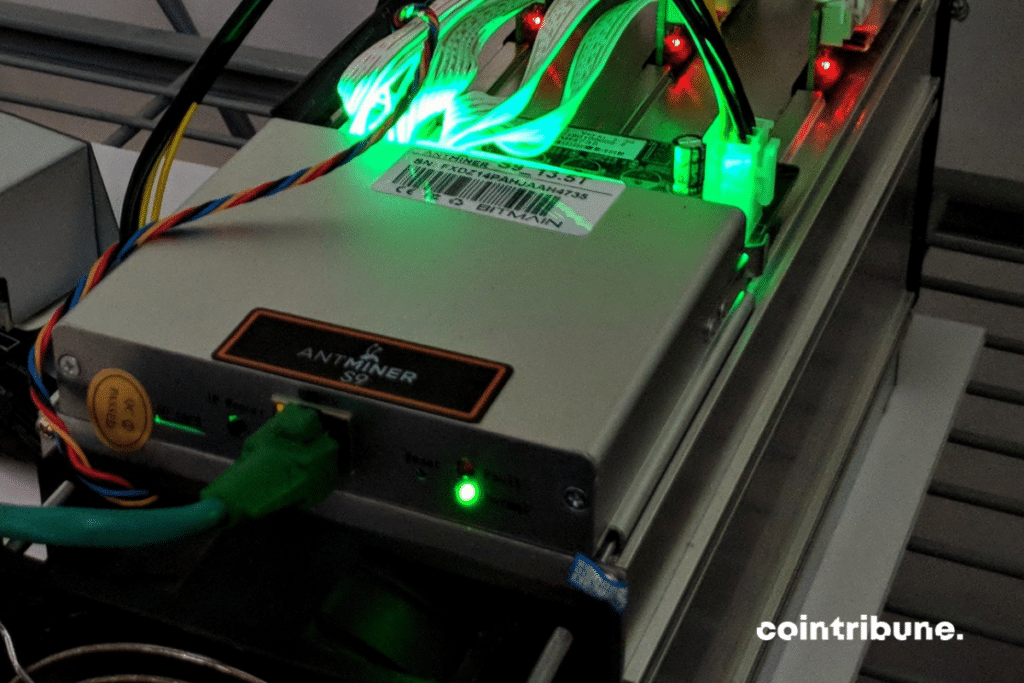🎶 Cruisin’ down the street in my 64
— Bitcoin News (@BitcoinNewsCom) May 14, 2023
Solo mining, hashing for more 🎶
pic.twitter.com/ZiGvsoKP2X
A
A
Can a crypto miner hit the jackpot on their own?
Mon 03 Jul 2023 ▪
4
min read ▪ by
▪
Mining
What is the probability of winning 6.25 bitcoins by mining alone, i.e. without using a pool?

Solo Mining
Miners help secure Bitcoin by contributing energy in the form of electricity. These electrons are used to power ASICs (Application Specific Integrated Circuits). These are integrated circuits (microprocessors) designed to hash with the SHA-256 algorithm.
This process is called “Proof-of-Work”. Miners repeat the same hash operation hundreds of billions of times per second, until they find a valid hash. The difficulty is adjusted every two weeks, so that only one is found every ten minutes or so.
The miner who finds a good hash earns the right to validate a batch of transactions. These must not weigh more than one million bytes (1 MB “blocks”). This gives us a large handful of transactions per second.
In exchange for their energy, miners receive 6.25 BTC for each block. However, very few receive the full 6.25 BTC. The reason for this is that miners group together in large pools to smooth out their income.
A pool is a kind of cooperative where the BTC harvest is shared in proportion to the hashrate contributed by each member.
But some miners decide to pursue this solo, hoping one day to win the jackpot. In other words, 6.25 BTC all to themselves, or $190,000 at the time of writing.
46 years of hashrate
The probability of a solo minor winning the hash race is simply calculated by dividing his hashrate by the global hashrate.
Let’s say a miner owns a single Antminer. Let’s say the S19 XP model produces 140 TH/s. That’s 140,000 billion hashes per second.
And let’s say the global hashrate is 350 EH/s (350 billion hashes per second). The solo miner therefore has 1 / 2,500,000 of the total hashrate. It has a 0.00004% chance of finding a valid block (hash) every ten minutes.
Statistically, and over a very long period of time, the solo miner can expect to find a block every 2,500,000 blocks. In other words, every 46 years during which no income is expected. Divide this figure by the number of S19 XP miners you may have.
We can also calculate the probability for very small miners such as NerdMiner or Blockstream’s Jade cold wallet.
Jade can be used to mine, but the chances of success are slim. The wallet can calculate something on the order of 80,000 hashes per second. That’s 1/4 375 000 000 000 000 of the total hashrate.
A Jade will find a block (on average) in 830 million centuries. Put another way, you’re 200 million times more likely to win the Lotto.
It’s better to invest with a professional miner like French company BBGS, which sets up operations in the four corners of the world, wherever there’s a surplus of hydroelectric power.
Maximize your Cointribune experience with our "Read to Earn" program! For every article you read, earn points and access exclusive rewards. Sign up now and start earning benefits.
A
A
Bitcoin, geopolitical, economic and energy journalist.
DISCLAIMER
The views, thoughts, and opinions expressed in this article belong solely to the author, and should not be taken as investment advice. Do your own research before taking any investment decisions.